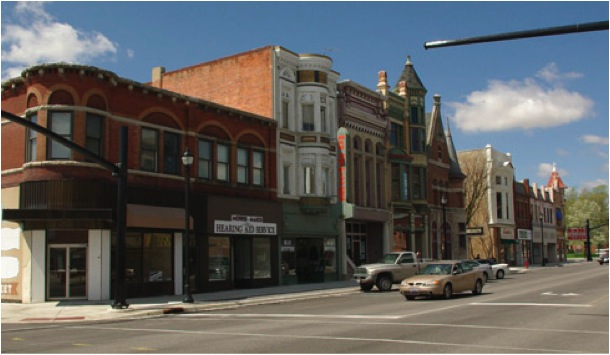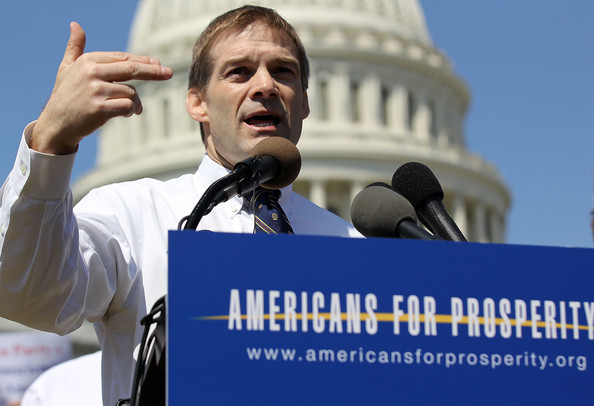UPDATE 1/5/12: Corrects the Congressional district outline.
At a recent meeting of the city council in Celina, Ohio, members considered a request to extend sewer lines to six homes that are currently outside the city’s boundaries. Extending the sewer line 800 feet to the houses would cost the city $40,000. A new water line was under discussion as well, doubling the cost.

The homeowners would supposedly pay back the amount in five years. That would amount to a monthly payment of more than $220 per household, without interest. But in cases like these, the beneficiaries of new utilities rarely pay the full cost.
For a place that's on the forefront of a heavily-subsidized brand of taxpayer-funded suburban sprawl, Celina is steeped in the kind of conservative politics that generally eschews government subsidies.
Celina sits on the boundary between two of the most conservative Congressional districts in the state of Ohio. Downtown Celina is represented by none other than House Speaker John Boehner, who has been the face of the movement to cut government spending. He's made it clear that he thinks transportation means highways (not bike lanes) and has been only too happy to slash transportation spending (unless he can get the green light for oil drilling by raising it.)
He's not as conservative, though, as Rep. Bob Latta, who represents the area just north of Celina, including the six homes that want sewer and water service. Latta is the son of Delbert Latta, who represented the area for 30 years and pushed for Amtrak service in his district. But his son has voted to cut public support for Amtrak, while pushing for oil drilling in the Alaska National Wildlife Refuge in order to lower gas prices. He was late to support the 3-C passenger rail service in Ohio, though he eventually did.
And Latta is probably not as conservative as Rep. Jim Jordan, whose district starts slightly east of Celina. Jordan, the head of the far-right Republican Study Committee, proposed a spending-cut bill last year that would have cut $6.5 billion from transportation subsidies, mostly for transit. And he wants to eliminate subsidies for Amtrak altogether.
How do conservative voters and politicians square their hatred for government subsidies with their city-shunning sprawl patterns that suck the lifeblood out of local governments – and taxpayers? Outward sprawl forces jurisdictions to keep building new roads and schools and to extend emergency services farther and farther afield. Sprawl induces driving and leads to more public pressure to expand roads -- a vicious circle of new development and new roads. Even in rural areas, one lane mile of new road can cost up to $9 million [PDF].
And then there's the utilities. In a 2000 report on the costs of sprawl, the Sierra Club highlighted the case of a Denver suburb, Arvada, which agreed to annex a new housing development and hook it into its sewer system, in much the way Celina is considering annexing those six houses. But in Arvada’s case, there were 90 houses, and they were extending the sewer, not 800 feet, but nine miles. The extension would cost up to $2.7 million, but all 90 new homes together would only bring in $116,370 a year in new property taxes.

Meanwhile, conservatives embrace this kind of outward development and consider smart-growth and livability initiatives – designed to curb the kind of sprawl that can result in so many government subsidies and cost taxpayers so much money – to be “social engineering” experiments to force people to live in cities against their will.
As Rob Puentes of the Brookings Institution wrote in The New Republic, though, nearly half of the country’s metropolitan population lives under antiquated land use policies that cry out for revision, since most of them require low densities and single family detached homes. “Worried about social engineering?” Puentes asks. “Brother, we’re living it!”
Still, many conservatives overlook the government policies that have exacerbated suburban sprawl and say suburban development patterns are really just the free will of the masses.
In his story this week in Salon about why the Republicans ignored urban issues in the lead-up to the Iowa primary, Daniel Denvir noted that “Today’s Republican candidates are rarely city-dwellers.” He quoted former Albuquerque Mayor David Rusk, who said, “The core of the Republican constituency in metropolitan America are the growing, racially and economically exclusive ‘outer suburbs’ whose privileged status Republicans seek to protect at all costs.”
Not all conservatives miss the irony. Conservative blogger E.D. Kain of True/Slant wrote, “Sprawl is a result of massive statist interventions into our culture and society, and its symptoms are equally enormous. Everything that conservatism has historically stood for is undermined by sprawl.”
Many conservatives live in communities where no mode of transportation can reasonably pay for itself, as they demand that mass transit do. They take advantage of the subsidized rural rail service that’s partly to blame for Amtrak’s money losses (which the Republicans take as a reason to de-fund Amtrak). And those who live in rural areas get to major transportation hubs using government-subsidized “essential” air service.
The politicians who represent them, however, have shown a determination to stop subsidizing even the non-automotive modes their constituents rely on. For example, a primary reason for the FAA shutdown in July was that Republicans wanted to reduce these sprawl-enabling air subsidies. Sen. John McCain's amendment to repeal the entire EAS program got some support from Republicans but many also opposed it. And the House plan to privatize Amtrak included a proposal to spin off short corridor trains -- many of which go through rural areas that would otherwise be unserved by rail -- to state DOTs.
Indeed, while these politicians defend the unsustainable choices their rural constituents have made, they would leave them with no mobility options at all except driving.





